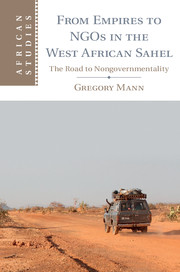Introduction to Part III: Saving the Sahel
Published online by Cambridge University Press: 05 January 2015
Summary
Saving the Sahel
What could be more miserable than the drought-stricken Sahel? The bush is dead, a pastoralist told the Nigerien scholar Diouldé Laya in 1974. Some in Mali argue that it’s been dead ever since, a death represented by the absence of wildlife. Rainy-season hunters seek scarce rabbits; the novice might hope for the tracks of antelope, but the larger game is gone and the only hoof prints belong to goats. Still, the bush is not dead, only dry, and the highways are hopping.
As the Introduction suggested, anyone sitting on the side of Mali’s national highway at any time since the 1990s would have discerned a pattern in the vehicles that passed. Depending on the day of the week, a few old “bens,” or trucks, might head for rural markets, so swollen with baggage and passengers that you can only wonder if they are more likely to tip or to burst. The occasional 18-wheeler passes, jerry cans and bedding slung from its belly, always going farther than you are. Every now and then, a bus slides down the road, its wheels so far out of alignment that it seems to move like a camel, the feet on each side moving in sync, one side always ahead of the other (Figure 1). Those buses will stop at roadblocks. Frenetic markets will form around them, bursting like bubbles when the buses move on, after papers are inspected, prayers performed, purchases made. Bush fruit, roasted meat, hard-boiled eggs, peanuts, and soft drinks. Students treat themselves; mothers might buy packets of cookies for children who will wave them like trophies; young people looking for labor demur.
- Type
- Chapter
- Information
- From Empires to NGOs in the West African SahelThe Road to Nongovernmentality, pp. 165 - 169Publisher: Cambridge University PressPrint publication year: 2014



